the boundaries between academia, government, business, activism, and personal belief.

the boundaries between academia, government, business, activism, and personal belief.

Spring 2025
In this course, students will learn about the political, constitutional, and social history of the United States from 1776 (the year the colonies declared their independence from Great Britain) to 1800 (the year Thomas Jefferson won the presidency in a heated partisan election for the presidency). Alexander Hamilton, an influential American statesman during this time, will be our guide to the many events and transformations that occurred during these years. The course is not, however, a biographical course about Hamilton. Topics covered include: the politics of independence, the Revolutionary War, the development of state and national republics, the creation of the U.S. Constitution, the role of ordinary people in the politics of the time period, the problem of slavery in the new nation, Native American power and loss, diplomatic affairs, and the rise of partisan politics.
Spring 2025
In what ways has Western Political Theory constructed, excluded, and denigrated gendered and sexualized political subjects? In what ways have these subjects resisted these politics, and organized for their freedom and sovereignty? This course will explore feminist political theories of the body, reproduction, and empire through a variety of theoretical styles and methodological approaches.